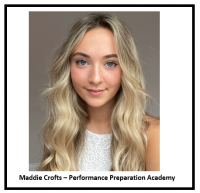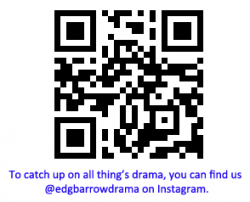Drama & Theatre
Welcome
Drama is an enthusiastic, vibrant and successful department. At Edgbarrow, we have a fully equipped, purpose-built Drama studio with the use of stage lights, sound and projection. We also have two additional spaces in the school, including the main hall which is home to our large-scale productions. We deliver exciting and thought-provoking lessons, which aim to link to our students wider understanding of the world, as well as allowing them to engage with many new and interesting elements of theatre. Drama at Edgbarrow is sequenced to ensure that students continually build upon prior learning and can make connections between the different topics they study within the subject.
Key Staff
Miss Carr - Head of Department
Mr Franklin - Teacher of Drama
Mr Portnow - Performing Arts Technician
Mrs Dix - HLTA (Creatives)
Key Stage 3
Curriculum Intent
At Key Stage 3, we intend to inspire our students to develop their acting skills, be creative, resilient and reflective, not only in the subject but as a person. This will enable them to be effective performers as well as kind and well-rounded members of the community.
Drama at Key Stage 3 should fulfil artistic, intellectual and social needs and our curriculum aims to cover all three. At Edgbarrow students will study specific units of work in these areas and will also have the opportunity to explore a plethora of different skills, topics and texts. The work covered in Key Stage 3 also works to prepare students who go on to take Drama at GCSE and A-Level.
Assessment Bands
Students will follow national guidelines throughout Key Stage 3 to support and prepare them for their Key Stage 4 courses. The school operates a banding system of 1-9 (9 being the highest band). Students will be given a target based on their Key Stage 2 scores and baseline assessments on arrival at Edgbarrow. The band they are awarded at the end of the Key Stage is intended to be indicative of the grade they may achieve at GCSE.
FOR YEAR 7 & 8 ONLY: We have recently changed the way in which we track progress in Key Stage 3. The new format is currently in operation with Year 7 and 8 only. In each individual subject, students are given one of three progress bands: foundation, intermediate and higher. These bands are based on Key Stage 2 scores, as well as evidence gathered by class teachers. Throughout Key Stage 3, students will be judged to be meeting, exceeding or below expectations for their given band. The headline criteria for each of these bands can be found below, as well as a short presentation explaining the new assessment and reporting format.
Summary Curriculum Plans
-
Drama Year 7 2024-25
download_for_offline
download_for_offlineDrama Year 7 2024-25
- Drama Year 8 2024-25 download_for_offline
download_for_offlineDrama Year 8 2024-25
- Drama Year 9 2024-25 download_for_offline
download_for_offlineDrama Year 9 2024-25
Key Stage 4
Curriculum Intent
At GCSE, our students will refine their acting and collaborative skills and produce original and polished performances. Students will feel confident in approaching written responses, by building an understanding and knowledge of how drama is created and performed.
Why Take Drama at GCSE?
GCSE Drama allows students to learn and engage with the world of Drama and Theatre, whilst underpinning this exploration with informed theoretical knowledge and theory. Students have the opportunity to perform, create and study existing performances and texts, whilst inevitably building a repertoire of transferable skills that can be used throughout their lives. These include skills in; communication, teamwork, confidence, leadership and time management. Drama is also a subject to look to pursue if you are considering a career in the arts, or for anyone who is interested in culture or social topics.
The GCSE Drama Course
The GCSE Drama course is split into three components: 2 pieces of coursework and the written examination.
The written examination focuses on three areas:
- Section A: Theatre roles and terminology
- Section B: Study of a set text
- Section C: Live theatre production
Within each section, you will need to demonstrate an understanding of theatre roles and terminology and be able to show an understanding of how both you and the other actors create characters, atmosphere and how ideas are presented.
The coursework is spread over the two years of the GCSE. You will complete two pieces, one devised (making the piece up on a theme) and one scripted, where you will need to learn lines for two sections of a play as well as practise the scenes.
A Summary of the AQA GCSE Drama Course
Component 1: Understanding Drama
- 1-hour 45min written exam
- 40% of your final result, 80 Marks
3 Sections:
- Section A: Multiple Choice
- Section B: Questions on a set play (open book)
- Section C: 2-part question on a live production
Component 2: Devising Drama
- 1 piece of devised work (20 Marks) + devising log book (60 Marks)
- 40% of your final result, 80 Marks
Component 3: Texts in Practice
- 2 extracts from a play performed for an external examiner
- 20% of your final result, 40 Marks
- Each extract is worth 20 Marks
Summary Curriculum Plans
-
Drama Year 10 2024-25
download_for_offline
download_for_offlineDrama Year 10 2024-25
- Drama Year 11 2024-25 download_for_offline
download_for_offlineDrama Year 11 2024-25
Key Stage 5
Curriculum Intent
At A-Level, our students will build upon their practical and analytical skills, to ensure they are confident in approaching and accessing all areas of the course. Students will build a toolbox of practical techniques to enhance their performances and will underpin their work with their theoretical exploration.
A-Level Drama & Theatre Studies Course
Drama & Theatre Studies is geared to exploring a wide range of Drama content including the study of theatre practitioners and an emphasis on practical creativity alongside research and theoretical understanding. Students can choose and research an area of practical study to support and enhance their performances and the course’s scope is both challenging and exciting.
There are 3 units in the A-Level and the students sit one written examination paper in the last year.
Evening theatre trips are run during the course to enable students to answer questions in their examination. It is essential the students see as many pieces of theatre as possible, to enable them to have a wider understanding of theatre and knowledge of live performance to answer the examination questions in detail. If you have any questions or concerns about this, please contact Miss Carr.A Summary of the AQA A-Level Drama & Theatre Studies Course
Component 1: Drama and theatre
- Study of two set plays developing knowledge and understanding of drama and theatre and then analysis and evaluation of the work of live theatre makers
- Two set plays will be Our Country's Good and Much Ado About Nothing.
- Written exam: 3 hours
- 40% of A-level
Component 2: Creating original drama (practical)
- Process of creating devised drama with a performance of devised drama (students may contribute as performer, designer or director).
- The devised piece must be influenced by the work and methodologies of one prescribed practitioner.
- 30% of A-Level
Component 3: Making theatre (practical)
- Practical exploration and interpretation of three extracts each taken from a different play.
- Extract 3 is to be performed as a final assessed piece (students may contribute as performer, designer or director).
- 30% of A-Level
Summary Curriculum Plans
-
Drama Year 12 2024-25
download_for_offline
download_for_offlineDrama Year 12 2024-25
- Drama Year 13 2024-25 download_for_offline
download_for_offlineDrama Year 13 2024-25
Homework Intent
Key Stage 3 - Homework is set to develop students’ understanding of drama, as well as preparing students for performance.
Key Stage 4 - Homework is set to develop students' understanding of drama as well as exploring the key texts that underpin the GCSE course. As well as this, homework in drama can also take the form of after-school rehearsals.
Inclusion
It is our intent that pupils with special educational needs/disabilities (SEND) follow the same curriculum, learn alongside their peers and achieve similar outcomes. In addition, they may benefit from additional opportunities in the lessons and in the co-curricular activities that are arranged especially for them.
SEND Implementation and Impact
Literacy
Reading Aims:
- To ensure students are equipped to understand command words in questions.
- To ensure students are equipped with a range of independent reading strategies to aid comprehension when reading and answering exam questions.
- To ensure students are equipped with a range of independent reading strategies when interpreting stimuli and play texts.
- To ensure students are equipped with a range of independent reading strategies when interpreting how authorial intent/directors intent/ language/ structure impact the meaning of a text.
- To support students in understanding new or complex vocabulary that they encounter in their reading.
- To support students with reading out loud and therefore pronunciation.
- To encourage students to read for pleasure outside of the lessons.
Writing Aims:
- To ensure students are equipped with strategies to construct their answers.
- To equip students with strategies to reflect on and redraft their writing.
- To explicitly teach key words for Drama.
- To support spelling, punctuation and grammar using the Whole School Feedback & Marking Policy to enable students to write fluently.
Spoken Language Aims:
- To ensure students understand the difference between formal and informal/colloquial language.
- To ensure students are equipped with the skills to structure a spoken performance.
- To support students to use projection and annunciation.
- To teach students how to listen and respond formally and respectfully.
- To provide students with opportunities for structured talk.
Co-Curricular
Productions are an exciting yearly event and performed at the end of the Spring term. All students from Year 7 to 13 are invited to take part and can contribute in many different ways! From performing, to sound and lighting, backstage crew, hair, make-up and choreography, the production is a real whole-school event!
Please visit our Galleries page to view photo from recent school productions including Grease, Billy Elliot and We Will Rock You.
In Years 7 and 8, there is a Drama Club. This after school club, gives students the opportunity to expand and explore their talents within drama.
Tech Club is run once a week by our Performing Arts Technician and allows students to explore the backstage roles and all the elements that are needed to put on a production.
For those students who wish to study Theatre or Performing Arts further, we offer 1:1 tuition to help prepare our students for continued professional development, this can include support with auditions and individual tutorials. We are very proud to have a number of alumni, who are currently working and/or training within the arts. At GCSE and A-Level, classes go on at least two trips to the theatre per year, this gives our students the opportunity to see live and professional theatre, as well as increasing ambition to create similar work.
Alumni
Aylin Scott - The Academy of Live & Recorded Arts
Harry Mayes - Broadcast Production Assistant for Warner Brothers

Maddie Crofts - Performance Preparation Academy
Phil Fletcher - BA Acting Hons Graduate from St. Mary's University
Ella Mae - Drama Studio London

Independent Study
Key Stage 3
Year 9 - The Curious Incident of the Dog in the Night-Time (Bloomsbury)
Year 9 - The Curious Incident of the Dog in the Night-Time (YouTube)Key Stage 4
Select to view current revision material
Key Stage 5
For further information regarding our Drama Curriculum please email:
Miss Carr (Head of Department) - Drama Year 13 2024-25 download_for_offline
- Drama Year 11 2024-25 download_for_offline
- Drama Year 8 2024-25 download_for_offline







